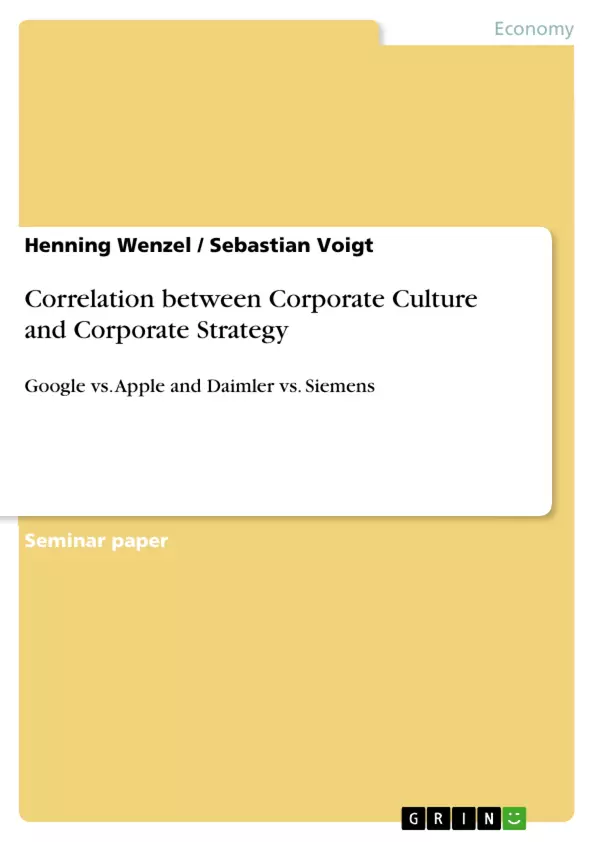The character of a company´s culture or work climate is gaining in importance. Culture is a product of the core values and business principles that executives espouse, the standards of what is ethically acceptable and what is not, the work practices and behaviours that define “how we do things around here”, its approach to people management and style of operating, the “chemistry” and the “personality” that permeates its work environment, and the stories that get told over and over to illustrate and reinforce the company´s values, business principles, and traditions.
A company´s culture is important because it influences the organization´s actions and approaches to conduct the business – in a very real sense, the culture is the company´s “operating system” or organizational DNA. All in all, culture as a concept is difficult to define and differs from company to company. The crafting of a strategy represents a managerial commitment to pursue a particular set of actions in growing the business, attracting and pleasing customers, competing successfully, conducting operations, and improving the company´s financial and market performance.
Even companies with same strategic and business concepts and comparable success differ in their approaches regarding the corporate culture. What becomes clear is that there is a correlation between culture and strategy. Hence the consistency between strategy and culture is a long-term competitive advantage and a key to corporate success. To counteract preventive a possible misfit between the corporate culture and the strategy, consideration of corporate culture as part of the concept to strategy implementation is essential.
Inhaltsverzeichnis (Table of Contents)
- Executive Summary
- Table of Contents
- List of Abbreviations
- List of Figures
- 1 Introduction
- 1.1 Objective
- 1.2 Methodology
- 2 Corporate Strategy
- 2.1 Definition of Strategy
- 2.2 Strategic Process
- 3 Corporate Culture
- 3.1 Definition of Corporate Culture
- 3.2 Levels of Corporate Culture
- 3.2.1 Basic assumptions
- 3.2.2 Values
- 3.2.3 Norms
- 4 Correlation between Culture and Strategy
- 4.1 Strategy Implementation
- 4.1.1 Strategy around Culture
- 4.1.2 Strategy by Culture Adaption
- 4.2 Company Examples
- 4.2.1 Company 1 – Google Inc.
- 4.2.2 Company 2 - Apple Inc.
- 4.2.3 Distinctions between Google Inc. and Apple Inc.
- 4.2.4 Company 3 - Daimler
- 4.2.5 Company 4 - Siemens
- 4.2.6 Distinctions between Daimler and Siemens
- 5 Conclusion
- Bibliography
- ITM-Checklist: 360-degrees analysis
Zielsetzung und Themenschwerpunkte (Objectives and Key Themes)
This paper investigates the complex relationship between corporate culture and strategy. The aim is to explore how a company's culture can influence its strategic decisions and ultimately impact its success. The paper examines the definition and levels of corporate culture, and then analyzes the correlation between culture and strategy implementation.
- The importance of corporate culture as a key driver of organizational performance
- The impact of culture on strategic decision-making and implementation
- The correlation between corporate culture and strategic success
- The role of company examples in illustrating the relationship between culture and strategy
- The implications of culture for long-term competitive advantage
Zusammenfassung der Kapitel (Chapter Summaries)
The paper begins by introducing the objective and methodology of the study. It then delves into the concept of corporate strategy, defining it and outlining the strategic process. Chapter 3 focuses on corporate culture, defining its various levels and exploring the underlying assumptions, values, and norms that shape a company's culture. Chapter 4 examines the correlation between corporate culture and strategy, analyzing the implications of culture for strategy implementation and exploring company examples that illustrate this relationship. The paper concludes by summarizing the key findings and insights.
Schlüsselwörter (Keywords)
The key terms and concepts in this work include corporate culture, strategy, strategic process, strategy implementation, organizational DNA, company examples, Google, Apple, Daimler, Siemens, competitive advantage, and long-term success.
Frequently Asked Questions
What is the relationship between corporate culture and corporate strategy?
There is a strong correlation between the two. Corporate culture acts as the "operating system" or DNA of a company, and its consistency with the corporate strategy is a key driver for long-term success and competitive advantage.
How does corporate culture influence strategy implementation?
Culture defines "how we do things around here." If a strategy does not align with the existing values, norms, and behaviors of the employees, it is likely to fail. Successful companies either build strategy around their culture or carefully adapt the culture to support the strategy.
What are the different levels of corporate culture?
Corporate culture typically consists of three levels: basic underlying assumptions (often unconscious), espoused values (principles and goals), and norms/artifacts (visible behaviors and work practices).
How do the cultures of Google and Apple differ?
While both are successful tech giants, Google is often characterized by a more open, experimental, and "bottom-up" culture, whereas Apple is known for its high level of secrecy, design-centric focus, and "top-down" precision.
Why is a "misfit" between culture and strategy dangerous?
A misfit leads to internal resistance, low employee engagement, and inefficient operations. Without cultural backing, even the best-crafted strategic plan cannot be effectively executed.
Can corporate culture be defined easily?
No, culture is a complex and often intangible concept. It is a product of core values, ethical standards, leadership styles, and the "chemistry" of the work environment, making it unique to every organization.
- Arbeit zitieren
- Henning Wenzel (Autor:in), Sebastian Voigt (Autor:in), 2013, Correlation between Corporate Culture and Corporate Strategy, München, GRIN Verlag, https://www.grin.com/document/315514



